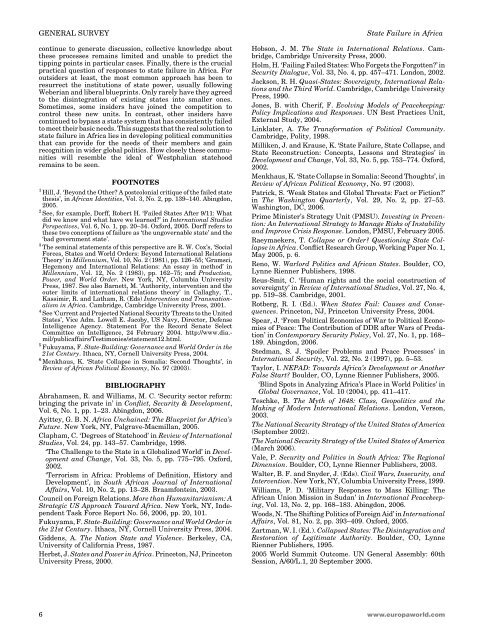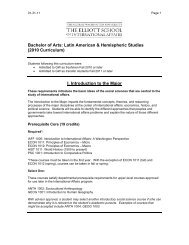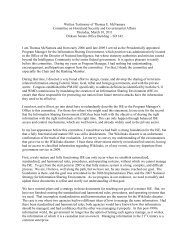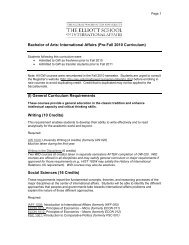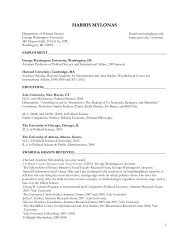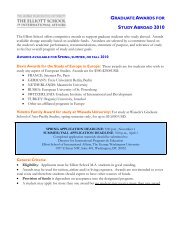state failure in africa: causes, consequences and responses
state failure in africa: causes, consequences and responses
state failure in africa: causes, consequences and responses
Create successful ePaper yourself
Turn your PDF publications into a flip-book with our unique Google optimized e-Paper software.
GENERAL SURVEY State Failure <strong>in</strong> Africa<br />
cont<strong>in</strong>ue to generate discussion, collective knowledge about<br />
these processes rema<strong>in</strong>s limited <strong>and</strong> unable to predict the<br />
tipp<strong>in</strong>g po<strong>in</strong>ts <strong>in</strong> particular cases. F<strong>in</strong>ally, there is the crucial<br />
practical question of <strong>responses</strong> to <strong>state</strong> <strong>failure</strong> <strong>in</strong> Africa. For<br />
outsiders at least, the most common approach has been to<br />
resurrect the <strong>in</strong>stitutions of <strong>state</strong> power, usually follow<strong>in</strong>g<br />
Weberian <strong>and</strong> liberal bluepr<strong>in</strong>ts. Only rarely have they agreed<br />
to the dis<strong>in</strong>tegration of exist<strong>in</strong>g <strong>state</strong>s <strong>in</strong>to smaller ones.<br />
Sometimes, some <strong>in</strong>siders have jo<strong>in</strong>ed the competition to<br />
control these new units. In contrast, other <strong>in</strong>siders have<br />
cont<strong>in</strong>ued to bypass a <strong>state</strong> system that has consistently failed<br />
to meet their basic needs. This suggests that the real solution to<br />
<strong>state</strong> <strong>failure</strong> <strong>in</strong> Africa lies <strong>in</strong> develop<strong>in</strong>g political communities<br />
that can provide for the needs of their members <strong>and</strong> ga<strong>in</strong><br />
recognition <strong>in</strong> wider global politics. How closely these communities<br />
will resemble the ideal of Westphalian <strong>state</strong>hood<br />
rema<strong>in</strong>s to be seen.<br />
FOOTNOTES<br />
1<br />
Hill, J. ‘Beyond the Other? A postcolonial critique of the failed <strong>state</strong><br />
thesis’, <strong>in</strong> African Identities, Vol. 3, No. 2, pp. 139–140. Ab<strong>in</strong>gdon,<br />
2005.<br />
2<br />
See, for example, Dorff, Robert H. ‘Failed States After 9/11: What<br />
did we know <strong>and</strong> what have we learned?’ <strong>in</strong> International Studies<br />
Perspectives, Vol. 6, No. 1, pp. 20–34. Oxford, 2005. Dorff refers to<br />
these two conceptions of <strong>failure</strong> as ‘the ungovernable <strong>state</strong>’ <strong>and</strong> the<br />
‘bad government <strong>state</strong>’.<br />
3<br />
The sem<strong>in</strong>al <strong>state</strong>ments of this perspective are R. W. Cox’s, ‘Social<br />
Forces, States <strong>and</strong> World Orders: Beyond International Relations<br />
Theory’ <strong>in</strong> Millennium, Vol. 10, No. 2 (1981), pp. 126–55; ‘Gramsci,<br />
Hegemony <strong>and</strong> International Relations: An essay <strong>in</strong> method’ <strong>in</strong><br />
Millennium, Vol. 12, No. 2 (1983), pp. 162–75; <strong>and</strong> Production,<br />
Power, <strong>and</strong> World Order. New York, NY, Columbia University<br />
Press, 1987. See also Barnett, M. ‘Authority, <strong>in</strong>tervention <strong>and</strong> the<br />
outer limits of <strong>in</strong>ternational relations theory’ <strong>in</strong> Callaghy, T.,<br />
Kassimir, R. <strong>and</strong> Latham, R. (Eds) Intervention <strong>and</strong> Transnationalism<br />
<strong>in</strong> Africa. Cambridge, Cambridge University Press, 2001.<br />
4<br />
See ‘Current <strong>and</strong> Projected National Security Threats to the United<br />
States’, Vice Adm. Lowell E. Jacoby, US Navy, Director, Defense<br />
Intelligence Agency. Statement For the Record Senate Select<br />
Committee on Intelligence, 24 February 2004. http://www.dia.mil/publicaffairs/Testimonies/<strong>state</strong>ment12.html.<br />
5<br />
Fukuyama, F. State-Build<strong>in</strong>g: Governance <strong>and</strong> World Order <strong>in</strong> the<br />
21st Century. Ithaca, NY, Cornell University Press, 2004.<br />
6<br />
Menkhaus, K. ‘State Collapse <strong>in</strong> Somalia: Second Thoughts’, <strong>in</strong><br />
Review of African Political Economy, No. 97 (2003).<br />
BIBLIOGRAPHY<br />
Abrahamsen, R. <strong>and</strong> Williams, M. C. ‘Security sector reform:<br />
br<strong>in</strong>g<strong>in</strong>g the private <strong>in</strong>’ <strong>in</strong> Conflict, Security & Development,<br />
Vol. 6, No. 1, pp. 1–23. Ab<strong>in</strong>gdon, 2006.<br />
Ayittey, G. B. N. Africa Uncha<strong>in</strong>ed: The Bluepr<strong>in</strong>t for Africa’s<br />
Future. New York, NY, Palgrave-Macmillan, 2005.<br />
Clapham, C. ‘Degrees of Statehood’ <strong>in</strong> Review of International<br />
Studies, Vol. 24, pp. 143–57. Cambridge, 1998.<br />
‘The Challenge to the State <strong>in</strong> a Globalized World’ <strong>in</strong> Development<br />
<strong>and</strong> Change, Vol. 33, No. 5, pp. 775–795. Oxford,<br />
2002.<br />
‘Terrorism <strong>in</strong> Africa: Problems of Def<strong>in</strong>ition, History <strong>and</strong><br />
Development’, <strong>in</strong> South African Journal of International<br />
Affairs, Vol. 10, No. 2, pp. 13–28. Braamfonte<strong>in</strong>, 2003.<br />
Council on Foreign Relations. More than Humanitarianism: A<br />
Strategic US Approach Toward Africa. New York, NY, Independent<br />
Task Force Report No. 56, 2006, pp. 20, 101.<br />
Fukuyama, F. State-Build<strong>in</strong>g: Governance <strong>and</strong> World Order <strong>in</strong><br />
the 21st Century. Ithaca, NY, Cornell University Press, 2004.<br />
Giddens, A. The Nation State <strong>and</strong> Violence. Berkeley, CA,<br />
University of California Press, 1987.<br />
Herbst, J. States <strong>and</strong> Power <strong>in</strong> Africa. Pr<strong>in</strong>ceton, NJ, Pr<strong>in</strong>ceton<br />
University Press, 2000.<br />
Hobson, J. M. The State <strong>in</strong> International Relations. Cambridge,<br />
Cambridge University Press, 2000.<br />
Holm, H. ‘Fail<strong>in</strong>g Failed States: Who Forgets the Forgotten?’ <strong>in</strong><br />
Security Dialogue, Vol. 33, No. 4, pp. 457–471. London, 2002.<br />
Jackson, R. H. Quasi-States: Sovereignty, International Relations<br />
<strong>and</strong> the Third World. Cambridge, Cambridge University<br />
Press, 1990.<br />
Jones, B. with Cherif, F. Evolv<strong>in</strong>g Models of Peacekeep<strong>in</strong>g:<br />
Policy Implications <strong>and</strong> Responses. UN Best Practices Unit,<br />
External Study, 2004.<br />
L<strong>in</strong>klater, A. The Transformation of Political Community.<br />
Cambridge, Polity, 1998.<br />
Milliken, J. <strong>and</strong> Krause, K. ‘State Failure, State Collapse, <strong>and</strong><br />
State Reconstruction: Concepts, Lessons <strong>and</strong> Strategies’ <strong>in</strong><br />
Development <strong>and</strong> Change, Vol. 33, No. 5, pp. 753–774. Oxford,<br />
2002.<br />
Menkhaus, K. ‘State Collapse <strong>in</strong> Somalia: Second Thoughts’, <strong>in</strong><br />
Review of African Political Economy, No. 97 (2003).<br />
Patrick, S. ‘Weak States <strong>and</strong> Global Threats: Fact or Fiction?’<br />
<strong>in</strong> The Wash<strong>in</strong>gton Quarterly, Vol. 29, No. 2, pp. 27–53.<br />
Wash<strong>in</strong>gton, DC, 2006.<br />
Prime M<strong>in</strong>ister’s Strategy Unit (PMSU). Invest<strong>in</strong>g <strong>in</strong> Prevention:<br />
An International Strategy to Manage Risks of Instability<br />
<strong>and</strong> Improve Crisis Response. London, PMSU, February 2005.<br />
Raeymaekers, T. Collapse or Order? Question<strong>in</strong>g State Collapse<br />
<strong>in</strong> Africa. Conflict Research Group, Work<strong>in</strong>g Paper No. 1,<br />
May 2005, p. 6.<br />
Reno, W. Warlord Politics <strong>and</strong> African States. Boulder, CO,<br />
Lynne Rienner Publishers, 1998.<br />
Reus-Smit, C. ‘Human rights <strong>and</strong> the social construction of<br />
sovereignty’ <strong>in</strong> Review of International Studies, Vol. 27, No. 4,<br />
pp. 519–38. Cambridge, 2001.<br />
Rotberg, R. I. (Ed.). When States Fail: Causes <strong>and</strong> Consequences.<br />
Pr<strong>in</strong>ceton, NJ, Pr<strong>in</strong>ceton University Press, 2004.<br />
Spear, J. ‘From Political Economies of War to Political Economies<br />
of Peace: The Contribution of DDR after Wars of Predation’<br />
<strong>in</strong> Contemporary Security Policy, Vol. 27, No. 1, pp. 168–<br />
189. Ab<strong>in</strong>gdon, 2006.<br />
Stedman, S. J. ‘Spoiler Problems <strong>and</strong> Peace Processes’ <strong>in</strong><br />
International Security, Vol. 22, No. 2 (1997), pp. 5–53.<br />
Taylor, I. NEPAD: Towards Africa’s Development or Another<br />
False Start? Boulder, CO, Lynne Rienner Publishers, 2005.<br />
‘Bl<strong>in</strong>d Spots <strong>in</strong> Analyz<strong>in</strong>g Africa’s Place <strong>in</strong> World Politics’ <strong>in</strong><br />
Global Governance, Vol. 10 (2004), pp. 411–417.<br />
Teschke, B. The Myth of 1648: Class, Geopolitics <strong>and</strong> the<br />
Mak<strong>in</strong>g of Modern International Relations. London, Verson,<br />
2003.<br />
The National Security Strategy of the United States of America<br />
(September 2002).<br />
The National Security Strategy of the United States of America<br />
(March 2006).<br />
Vale, P. Security <strong>and</strong> Politics <strong>in</strong> South Africa: The Regional<br />
Dimension. Boulder, CO, Lynne Rienner Publishers, 2003.<br />
Walter, B. F. <strong>and</strong> Snyder, J. (Eds). Civil Wars, Insecurity, <strong>and</strong><br />
Intervention. New York, NY, Columbia University Press, 1999.<br />
Williams, P. D. ‘Military Responses to Mass Kill<strong>in</strong>g: The<br />
African Union Mission <strong>in</strong> Sudan’ <strong>in</strong> International Peacekeep<strong>in</strong>g,<br />
Vol. 13, No. 2, pp. 168–183. Ab<strong>in</strong>gdon, 2006.<br />
Woods, N. ‘The Shift<strong>in</strong>g Politics of Foreign Aid’ <strong>in</strong> International<br />
Affairs, Vol. 81, No. 2, pp. 393–409. Oxford, 2005.<br />
Zartman, W. I. (Ed.). Collapsed States: The Dis<strong>in</strong>tegration <strong>and</strong><br />
Restoration of Legitimate Authority. Boulder, CO, Lynne<br />
Rienner Publishers, 1995.<br />
2005 World Summit Outcome. UN General Assembly: 60th<br />
Session, A/60/L.1, 20 September 2005.<br />
6 www.europaworld.com


